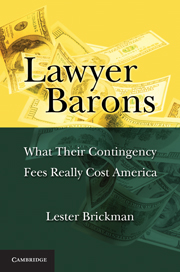Book contents
- Frontmatter
- Contents
- Foreword: Sorting Out Our National Liability Crisis by Richard A. Epstein
- Acknowledgments
- LAWYER BARONS
- Introduction
- 1 The Origin of the Contingency Fee
- 2 How Profitable Are Contingency Fees?
- 3 Are Contingency Fee Profits “Reasonable”?
- 4 How Tort Lawyers Have Increased Their Profits by Restraining Competition
- 5 Why the Market Has Failed to Correct the Absence of Price Competition
- 6 Impediments Imposed by the Bar to Price Competition
- 7 The Effects of Incentives Created by Contingency Fees
- 8 How the Quest for Profits Influenced the Development of the Tort System
- 9 Lawyers' Role in the Expansion of Tort Liability
- 10 The Role of the Judiciary in Tort System Expansion
- 11 Current and Future Expansions of Tort Liability
- 12 The “Litigation Explosion”
- 13 Measures of the Rate of Expansion of Tort Liability
- 14 The Relationship between Injury Rates and Tort System Costs
- 15 The Impacts of Substantial Increases in Tort Lawyers' Effective Hourly Rates
- 16 Class Actions
- 17 Fees in Class Actions
- 18 How Class Action Lawyers Game Fee Setting
- 19 Securities Class Actions
- 20 Regulation through Litigation
- 21 A New Role for Punitive Damages
- 22 For-Profit Partnerships between State Attorneys General and Contingency Fee Lawyers
- Conclusion
- Appendix A A Critique of Alex Tabarrok
- Appendix B Calculating Tort Lawyers' Effective Hourly Rates in 1960
- Appendix C Electronic Discovery and the Use of Contract Lawyers
- Appendix D The HMO Litigation
- Appendix E The GM “Side Saddle” Truck Litigation
- Appendix F Modern Class Actions Undermine Democratic Precepts
- Appendix G Other Ways Lawyers Game Class Action Fees
- Appendix H Nonrecourse Financing of Tort Litigation
- Appendix I Political Contributions by Tort Lawyers and the U.S. Chamber of Commerce
- Appendix J Special Rules Favoring Lawyers
- Appendix K The Ultimate Medical Expense “Buildup”: Whiplash
- Appendix L The Effect of Punitive Damages on Compensatory Awards
- Index
10 - The Role of the Judiciary in Tort System Expansion
Published online by Cambridge University Press: 05 June 2012
- Frontmatter
- Contents
- Foreword: Sorting Out Our National Liability Crisis by Richard A. Epstein
- Acknowledgments
- LAWYER BARONS
- Introduction
- 1 The Origin of the Contingency Fee
- 2 How Profitable Are Contingency Fees?
- 3 Are Contingency Fee Profits “Reasonable”?
- 4 How Tort Lawyers Have Increased Their Profits by Restraining Competition
- 5 Why the Market Has Failed to Correct the Absence of Price Competition
- 6 Impediments Imposed by the Bar to Price Competition
- 7 The Effects of Incentives Created by Contingency Fees
- 8 How the Quest for Profits Influenced the Development of the Tort System
- 9 Lawyers' Role in the Expansion of Tort Liability
- 10 The Role of the Judiciary in Tort System Expansion
- 11 Current and Future Expansions of Tort Liability
- 12 The “Litigation Explosion”
- 13 Measures of the Rate of Expansion of Tort Liability
- 14 The Relationship between Injury Rates and Tort System Costs
- 15 The Impacts of Substantial Increases in Tort Lawyers' Effective Hourly Rates
- 16 Class Actions
- 17 Fees in Class Actions
- 18 How Class Action Lawyers Game Fee Setting
- 19 Securities Class Actions
- 20 Regulation through Litigation
- 21 A New Role for Punitive Damages
- 22 For-Profit Partnerships between State Attorneys General and Contingency Fee Lawyers
- Conclusion
- Appendix A A Critique of Alex Tabarrok
- Appendix B Calculating Tort Lawyers' Effective Hourly Rates in 1960
- Appendix C Electronic Discovery and the Use of Contract Lawyers
- Appendix D The HMO Litigation
- Appendix E The GM “Side Saddle” Truck Litigation
- Appendix F Modern Class Actions Undermine Democratic Precepts
- Appendix G Other Ways Lawyers Game Class Action Fees
- Appendix H Nonrecourse Financing of Tort Litigation
- Appendix I Political Contributions by Tort Lawyers and the U.S. Chamber of Commerce
- Appendix J Special Rules Favoring Lawyers
- Appendix K The Ultimate Medical Expense “Buildup”: Whiplash
- Appendix L The Effect of Punitive Damages on Compensatory Awards
- Index
Summary
ROBERT KAGAN'S EMPHASIS OF THE ROLE OF STATE supreme court judges in the tort reform wars is spot on. Lawyers and judges share a mutual interest in expanding the scope of liability of the tort system. By facilitating the expansion of tort liability, judges not only support the interests of lawyers, but also increase their own regulatory role and their ability to impose their policy preferences onto society. This chapter explores the judicial role in the expansion of the tort system through analysis of state supreme court invalidations of tort reform laws and other collaborative efforts of lawyers and judges to expand tort liability.
Nowhere do the bare knuckles of state supreme court judges show through their black robes more plainly than when they invalidate legislative efforts to contract previous judicial expansions of tort liability. These frequent invalidations often violate basic constitutional principles. Unlike the U.S. government, which only has the powers granted to it under the Constitution, state governments have broad general powers, limited only by their state constitutions and the powers they have ceded to the United States. The broadest state power is the police power, which empowers state legislatures to enact legislation to advance the health, safety, morals, and general welfare of the populace. Though common law courts are largely responsible for developing contract, tort, and property law, legislatures have always retained the power to create, modify, or repeal these rules.
- Type
- Chapter
- Information
- Lawyer BaronsWhat Their Contingency Fees Really Cost America, pp. 169 - 182Publisher: Cambridge University PressPrint publication year: 2011



